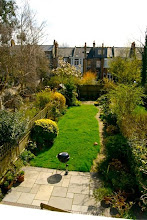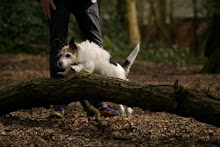There was such a lively audience at my talk at Hampstead Waterstones yesterday evening -- and as an event, it felt unusually atmospheric, because we were a stone's throw away from Daphne's childhood haunts, and from the graveyard in Church Row where the Du Mauriers are buried. Lots of good questions from the audience -- including one about Gertrude Lawrence's relationship with Daphne (Gertie was Noel Coward's favourite actress; and she was the last of Gerald du Maurier's lovers). I said that I didn't know the definitive answer to the question -- did Gertrude and Daphne have an affair? -- because I wasn't in the bedroom, though obviously, the speculation has been intense. In a way, what I think is more revealing is the blurring of boundaries -- hence Gerald's affair with Gertie, a young actress not much older than his daughter, at a time when he was intensely jealous of Daphne's romantic relationships with other men (including her cousin Geoffrey, who was the same age as Gerald, and a great friend of his).
What does everyone else think?
Wednesday, 9 April 2008
Subscribe to:
Post Comments (Atom)









10 comments:
Glad to hear the event went well!
Your post makes me wonder whether you saw the "adaptation" Daphne last year on TV and what youy thought of it, since it was mainly on Daphne's relationship with Gertie.
Cristina.
I did see it -- and in fact, I watched it in Fowey, with various other Du Maurier enthusiasts, including her publishers from Virago, because it coincided with me being there to do a talk at last year's Du Maurier festival. And I have to say, none of us were convinced by it, but that doesn't make it less valid. I suppose it's just another manifestation of the emerging Du Maurier myth -- which, as you know, I think is gathering pace with as much rapidity as the Bronte Myth did in the twenty years after their deaths.
Did you see have a chance to see it? I'd be interested to know your take on it.
I saw the BBC's Daphne last May when I was living in Kenilworth. I like how you put it: "none of us were convinced by it, but that doesn't make it less valid." It makes me think of the Greek poet Hesiod's line about the Muses telling "lies like truth." I suppose that's what fiction is, and that's how I viewed Daphne. In any case, if it did nothing else, it made me wish for more good roles for the amazing Janet McTeer (and I was recently rewarded with her Mrs. Dashwood in Sense and Sensibility).
Rob -- I completely agree with you about Janet McTeer -- she's terrific. And she did give a great sense of Gertie as spirited and irresistible. But I instinctively distrust anything that claims to reveal "The Truth" -- as if the truth is an immutable object -- about someone else's life. Life is always messier and more mysterious than the artful version of it, don't you think?
Yes, I do agree with you. It's interesting that the last Virago Modern Classic I read was Nina Bawden's Walking Naked, which has as its narrator a novelist who seems to use fiction to make neater versions of her own life. I guess I appreciated the television Daphne as a good story with fictional characters named Daphne Du Maurier and Gertrude Lawrence, but I certainly didn't imagine I was seeing life itself.
Yes, I did watch it. Actually, I remember being interested in it when I first heard about it last year but it wasn't until I was reading your Daphne that I managed to grab a copy and sit down to watch.
I'm only starting to know more about Daphne so I found myself what could be a fictitious story. So I enjoyed it but I thought I wouldn't have noticed any difference had the main character been called Jane Smith instead of Daphne du Maurier. Just like Rob says above.
Hmmmm... The du Maurier myth - interesting.
Cristina.
I didn't see the TV programme so cannot comment but I am intrigued and fascinated by the relationship between Daphne and Gerald which gave rise to many of Daphne's later psychological problems that you flag so intelligently in your novel, Justine. The signs are that it wasn't completely healthy even if no physical contact ever took place.
The father and daughter relationship is a strangely intense one, perhaps more so than that of mother and son
I haven't read Nina Bawden's novel, but I think I will do now. It sounds interesting. She also wrote a very intelligent review of "Daphne" (my novel, rather than last year's drama) in the Evening Standard, in which she discussed some of the ideas that have also arisen out of everyone's comments here, and which my novel acknowledges -- that any written version of the truth about someone else's life is itself a kind of fiction. That's precisely why I wrote a novel about a novelist, who was attempting to face up to the truth of her past, yet who also found it impossible, at times, to negotiate the blurred boundaries of fantasy and reality. And Sally, I agree, her relationship with her father -- an actor -- is absolutely crucial to this.
Talking to "someone else" in Fowey last week we debated the idea that women's friendships were also very different then, deeply sincere and loving without necessarily being lesbian love affairs.
I tend to agree with the 'someone else' in Fowey about that. It's unlikely that we'll ever know the truth, but I'm inclined to think that Daphne's relationship with Gertrude Lawrence was intense, but not necessarily sexual.
Post a Comment